Nutritional Preparedness: Strengthening Immune Defenses against Biological Threats
DOI:
https://doi.org/10.54393/df.v5i2.136Abstract
As the world continues to grapple with the aftermath of the COVID-19 pandemic, it has become increasingly evident how vulnerable we are to Biological Warfare. At the time of crisis, developing effective vaccines at such short notice and distributing them equitably proved to be a significant challenge. Some governments and health policy makers were ill-equipped to handle the task effectively resulting in unnecessary delays in the process of developing effective vaccines and ineffective supply chains that consequently resulted in millions of death worldwide. All this has urged and spurred governments to prioritize bio-preparedness and enhance bio-defense measures.
However apart from the Governments and health policy makers’ preparedness, COVID 19 pandemic has taught us invaluable lessons for preparing ourselves at individual level for such threats in future. We have now become more aware of the importance of personnel hygiene and maintaining body’s resistance against the foreign agent that could protect us from the biological threat. As seen during the recent pandemic, individuals with underlying health conditions, many of which were linked to poor dietary habits were more vulnerable to the infection. The pandemic has served as a wake-up call, highlighting the importance of prioritizing nutrition as a means of modulating our gut microbiome consequently fortifying our body's defenses against infections and diseases. A comprehensive literature survey has proven how healthy dietary choices including an adequate supply of essential and bioactive nutrients such as vitamins, proteins, Zinc etc and bioactive compounds such as probiotics, prebiotics, antioxidants, polyphenols etc, could reduce inflammations and help maintain a robust immune system.
Nutrition plays a crucial role in maintaining a healthy immune system and warding off infections. Research has consistently shown that a well-balanced diet rich in fruits, vegetables, whole grains, lean proteins, and healthy fats is essential for bolstering our immune response. These nutrient-dense foods provide our bodies with the vitamins, minerals, and antioxidants necessary to support our immune system's function. For instance, vitamin C, found in citrus fruits and leafy greens, is known for its immune-boosting properties. It aids in the production of white blood cells, which are vital for fighting off infections. Similarly, vitamin E, present in nuts, seeds, and vegetable oils, acts as an antioxidant that protects our cells from damage and strengthens our immune system.
As we navigate the post-pandemic landscape, it is imperative that we draw lessons from this experience and prioritize nutrition as a fundamental aspect of public health. Healthcare professionals, educators, and policymakers must work collaboratively to integrate nutrition education into public health initiatives and empower individuals to make informed food choices.
Furthermore, media outlets play a crucial role in disseminating information about the link between diet and immunity. By featuring expert opinions, sharing immune-boosting recipes, and debunking common myths surrounding nutrition, the media can help foster a culture of health-conscious eating habits.
In conclusion, the COVID-19 pandemic has underscored the critical role of diet in supporting our immune system's ability to combat infections and diseases. It is imperative that we seize this opportunity to prioritize nutrition education and promote healthy eating habits as essential components of public health initiatives. By doing so, we can empower individuals to take proactive steps towards bolstering their immune health and ultimately contribute to a healthier population. Personal preparedness complements government and health policy efforts. By taking responsibility for our own health and well-being, we can create a more resilient society that is better equipped to handle future biological threats.
References
.
Downloads
Published
How to Cite
Issue
Section
License
Copyright (c) 2024 DIET FACTOR (Journal of Nutritional and Food Sciences)

This work is licensed under a Creative Commons Attribution 4.0 International License.
This is an open-access journal and all the published articles / items are distributed under the terms of the Creative Commons Attribution License, which permits unrestricted use, distribution, and reproduction in any medium, provided the original author and source are credited. For comments












